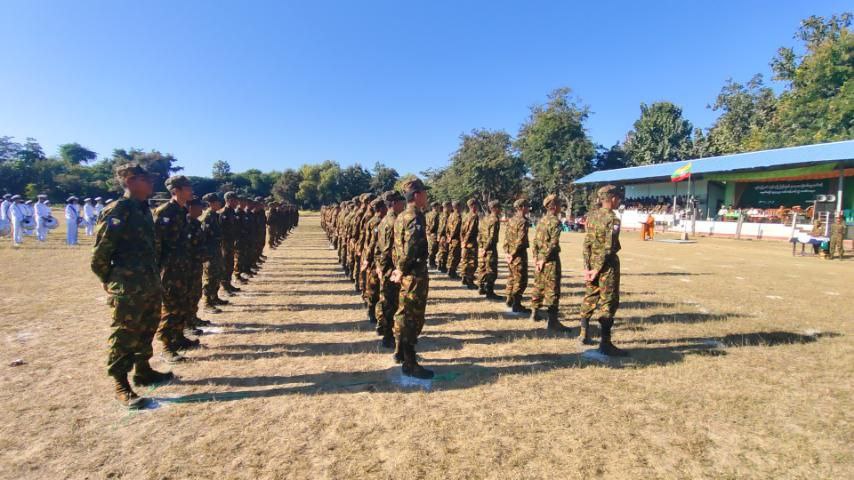January 22, 2024. (Than Lwin Times)
Facing grievous losses in nationwide battles resulting in severe depletion of troops, the Military Council is employing various tactics to recruit individuals into militia groups ,in the name of promoting community peace as a pretext in certain regions.
According to reports from locals and military sources to Than Lwin Times, the Military Council has exerted pressure on local governors to establish militia units in select townships and villages within the Bago, Magway, and Ayeyarwady regions.
Residents in affected villages report that administrators appointed by the Military Council, along with the Pyu-Saw-Htee militias, are compelling villagers to draw lots, with the intention of recruiting those selected as members in local militia units. Typically the demand is approximately 10 militia recruits, for every 100 individuals in the village population.
In certain regions, numerous locals temporarily evacuated their homes preemptively, as pro-Junta lobbyists utilized loudspeakers to urge locals to join the militia. Simultaneously, others sought shelter with the People’s Defense Force (PDF) troops.
In Bago Region, a villager shared that only some elderly men in his community reluctantly enrolled in the recruitment drive, driven by the Military Council’s warning that failure to contribute manpower for militia formation would result in the villages being considered supportive of PDF, and face the consequence of being burnt to the ground.
“We have been informed by village elders that, if we don’t contribute manpower to the militia, our village might be labeled pro-PDF and blacklisted. The Military Council indirectly threatened to burn down such villages, leaving us with no choice but to comply. Our village sent 5 villagers for militia training, but due to our reluctance, only those aged 50 or 60 were asked to register for the sake of the village. We provided these recruits only to avert potential harm to our village”, he told Than Lwin Times.
The Military Council has announced that enlisted militia members will undergo basic military training and be tasked with securing villages and communities, while being offered an incentive of a monthly salary of 120,000 MMK along with a bag of rice.
During a meeting with political parties in Naypyidaw on January 6th, the junta leader expressed a commitment to fostering peace and stability in the country, along with enhancements to the security and defense sectors for the welfare of the people.
He also urged political parties to leverage their organizational strength for the benefit of the country, and willingly contribute to its stability and peace.
A former police officer who joined the Civil Disobedience Movement (CDM) and maintains contact with military sources, revealed that he has received information indicating that the newly recruited militia troops are already slated to be deployed to the frontlines.
“The army is aiming to replace the depleted forces with militia due to their many casualties, and specifically to fill the gaps left by the deceased and injured troops. As per the Military Council’s announcement, recruited militia members are expected to take on national defense duties when required. This implies that there are already plans to deploy the newly recruited militia to the frontlines”, he pointed out.
Existing militia forces, established prior to the coup, are presently collaborating with the Military Council to combat ethnic armed forces (EAOs) and resistance groups in Shan State, Karenni State, Karen State, and Sagaing Region.
An independent report indicates that Myanmar currently has over 5000 militia units, and since 2008, military authorities have been actively working to expand this number to surpass 10,000.
Since achieving independence, successive Myanmar governments have deliberately established local militia units with the objective of assisting the Myanmar Military as informants and guides in suppressing regional insurgencies.
Political analysts have also highlighted that the Junta’s desperate attempt to extensively utilize militia forces, typically designated as reserve forces for the permanent military, underscores the acute decline in the strength of the regime’s armed forces.
News- Than Lwin Times
Photo-Military Council media

